Are You Interested in a Career In Forestry?
- September 2, 2024
- 0 comment
Forestry is the science and art of managing forests, tree plantations, and related natural resources. It involves everything from the conservation of biodiversity and the sustainable management of resources to the commercial production of timber and non-timber products. As concerns over climate change, deforestation, and environmental degradation rise, the demand for qualified forestry professionals is growing.

Understanding the Role of a Forester
A forester’s role is multifaceted, involving the management, conservation, and restoration of forests and woodland areas. They are responsible for maintaining the health of forest ecosystems, ensuring that forests can meet the needs of current and future generations. This involves a variety of tasks, from planting and managing trees to protecting forests from diseases, pests, and fires.
There are several specializations within forestry, each with its unique focus and responsibilities:
- Urban Forestry: Managing trees and green spaces in urban areas.
- Conservation Forestry: Focusing on preserving biodiversity and protecting endangered species.
- Timber Production: Managing forests for the sustainable production of wood products.
- Forest Management: Developing and implementing plans for the long-term health and productivity of forest ecosystems.
On a day-to-day basis, foresters may find themselves conducting field surveys, mapping forest areas, developing management plans, supervising planting and harvesting operations, and working with communities to promote sustainable practices. The work is hands-on and often requires spending considerable time outdoors, making it an ideal career in forestry for those who love nature.
Educational Requirements for Career In Forestry
To pursue a career in forestry, a strong educational foundation is essential. Most forestry positions require at least a bachelor’s degree in forestry, environmental science, or a related field. These programs typically cover subjects such as ecology, biology, soil science, and resource management, providing students with a comprehensive understanding of forest ecosystems.
In addition to a degree, specialized courses and certifications can enhance a forester’s expertise. For example, certifications in Geographic Information Systems (GIS) or forest management practices can make candidates more competitive in the job market. Many forestry programs also include internships or fieldwork components, which are invaluable for gaining practical experience.
Skills and Qualities Needed
Forestry is a profession that requires a unique blend of skills, ranging from technical expertise to strong interpersonal abilities. Some of the key skills and qualities needed for a successful career in forestry include:
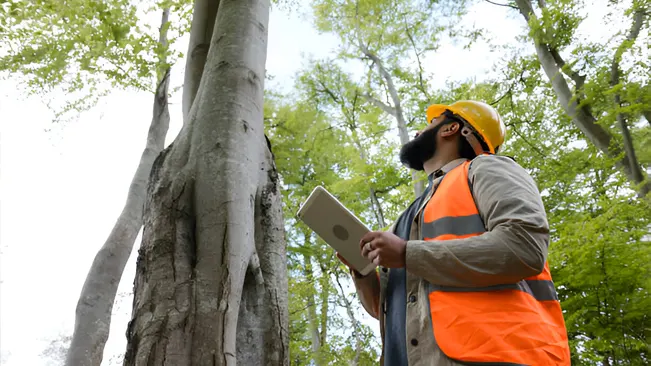
- Analytical Thinking: The ability to analyze complex environmental data and make informed decisions is crucial for managing forest resources effectively.
- Problem-Solving: Foresters often face challenges such as pest infestations, disease outbreaks, or environmental changes. Being able to develop and implement solutions is essential.
- Communication: Foresters must be able to communicate their findings and recommendations clearly to diverse audiences, including government officials, landowners, and the public.
- Physical Fitness: The job often requires working in remote areas and under varying weather conditions, making physical endurance important.
- Leadership and Teamwork: Foresters frequently work in teams and may be required to lead projects or coordinate with other professionals.
In addition to these skills, a deep passion for the environment and a commitment to conservation are essential for anyone considering a career in forestry. The ability to work independently, adaptability, and a willingness to continue learning throughout one’s career are also important traits.
Specializations Within Forestry
Forestry is a broad field with numerous specializations, each focusing on different aspects of forest management and conservation. Here are some of the key areas of specialization within forestry:
Silviculture
This specialization focuses on the growth and cultivation of trees. Silviculturists work on planting, thinning, and harvesting trees to ensure healthy forest growth and sustainable timber production.
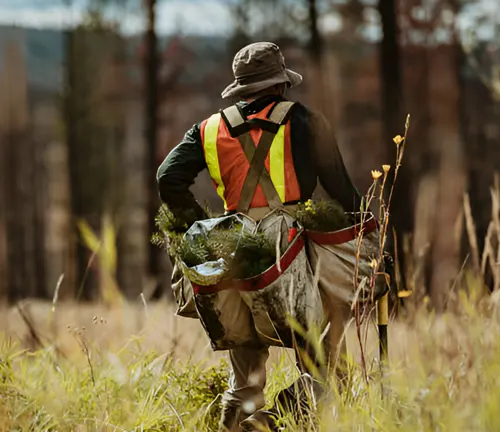
Wildlife Management
Foresters specializing in wildlife management work to balance the needs of wildlife populations with those of forest management. This can involve creating habitats, managing populations, and protecting endangered species.

Forest Engineering
Forest engineers are responsible for the planning, design, and implementation of infrastructure within forests, such as roads, bridges, and harvesting systems. Their work ensures that forestry operations are both efficient and environmentally sustainable.
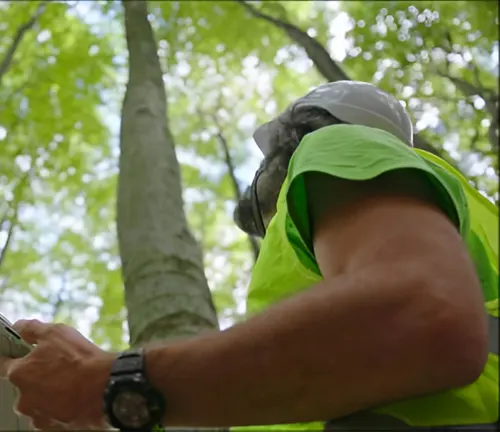
These specializations offer a range of career paths within forestry, each with its own set of challenges and rewards. Choosing a specialization allows foresters to focus on areas that align with their interests and strengths, whether it be working directly with trees, managing wildlife, or designing forest infrastructure.
Career Opportunities in Forestry
The forestry sector offers a wide range of career opportunities across different industries and sectors. Some of the most common employment areas for forestry professionals include:
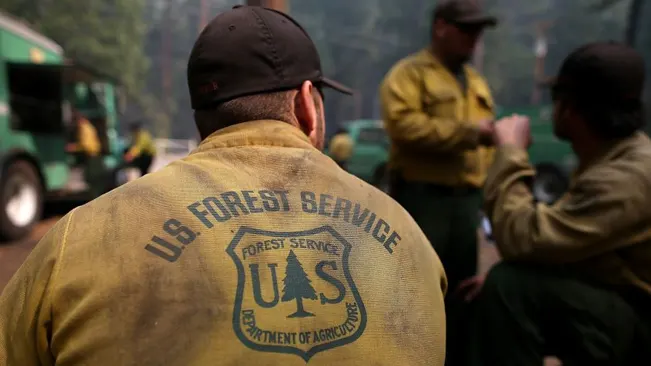
- Government Agencies: Many foresters work for federal, state, or local government agencies, such as the U.S. Forest Service or the Bureau of Land Management. These positions often involve managing public forests, enforcing environmental regulations, and developing conservation policies.
- Private Sector: Forestry professionals are also employed by private companies involved in timber production, land management, or environmental consulting. These positions may focus on sustainable resource management, timber harvesting, or environmental impact assessments.
- Non-Profit Organizations: Non-profit organizations focused on conservation, such as The Nature Conservancy or the World Wildlife Fund, also hire foresters to work on projects related to habitat restoration, species protection, and public education.
- Research and Academia: For those interested in research or teaching, universities and research institutions offer opportunities to conduct studies on forest ecology, climate change, and sustainable management practices.
In recent years, new roles have emerged in the forestry sector, particularly in areas related to climate change mitigation and carbon management. Foresters are increasingly involved in developing and implementing strategies to sequester carbon in forests, helping to reduce the impact of global warming.
Forestry and Technology
Technology is playing an increasingly important role in modern forestry, enabling more efficient and sustainable management practices. Some of the key technological advancements in the field include:

- Geographic Information Systems (GIS): GIS technology allows foresters to map and analyze forest data, helping them to make informed decisions about resource management, conservation efforts, and land use planning.
- Remote Sensing: Satellite imagery and drones are used to monitor forests, assess damage from natural disasters, and track changes in forest cover over time. This technology provides valuable data for managing large forest areas more effectively.
- Artificial Intelligence and Data Analysis: AI and machine learning are being used to analyze large datasets, predict forest growth, and optimize management practices. These technologies help foresters make more accurate and efficient decisions.
These advancements are transforming the forestry sector, making it possible to manage forests more sustainably and with greater precision. As technology continues to evolve, forestry professionals will need to stay updated on the latest tools and techniques to remain competitive in the field.
Financial Aspects of a Forestry Career
While passion for the environment is a major motivator for many pursuing a career in forestry, it’s also important to consider the financial aspects of the profession.
- Salary Expectations: The average salary for forestry professionals can vary widely depending on factors such as location, level of education, and area of specialization. According to the U.S. Bureau of Labor Statistics, the median annual wage for foresters was around $63,000 as of 2023. Those in higher-level positions or with advanced degrees may earn significantly more.
- Financial Benefits vs. Passion: While forestry may not be the highest-paying field, many professionals find the work rewarding enough to outweigh the financial considerations. The opportunity to make a positive impact on the environment and contribute to conservation efforts is a significant draw.
- Scholarships and Grants: For students pursuing degrees in forestry, there are numerous scholarships and grants available to help offset the cost of education. These financial resources can make it more feasible to pursue a career in this field without incurring significant debt.
Understanding the financial landscape of a forestry career can help you make informed decisions about your education and career path.
Personal and Professional Rewards
A career in forestry offers numerous rewards, both personal and professional. One of the most significant benefits is the opportunity to contribute to environmental conservation and sustainability. Foresters play a critical role in protecting and managing forest ecosystems, which are vital for maintaining biodiversity, regulating climate, and providing resources for human use.
- Personal Satisfaction: Many forestry professionals find deep personal satisfaction in their work, knowing they are making a positive impact on the planet. The ability to work outdoors, connect with nature, and see the tangible results of their efforts is a significant draw for many.
- Professional Growth: Forestry is a dynamic field with opportunities for continuous learning and growth. As environmental challenges evolve, so too do the methods and technologies used in forestry, providing opportunities for professional development and advancement.
- Work-Life Balance: Many forestry careers offer a good balance between work and personal life, particularly those that involve working in natural settings away from urban centers. The chance to work in beautiful outdoor environments is a unique aspect of the profession.
Overall, a career in forestry can be deeply fulfilling for those who are passionate about the environment and committed to making a difference.
Global Impact of Forestry Professionals
Forestry professionals have a significant impact on global environmental sustainability. Their work contributes to the conservation of forests, which play a crucial role in regulating the Earth’s climate, preserving biodiversity, and supporting human livelihoods.
- Climate Change Mitigation: Forests are one of the most important tools in the fight against climate change, acting as carbon sinks that absorb and store carbon dioxide. Foresters play a key role in managing these carbon sinks and developing strategies to enhance their effectiveness.
- Global Forest Policies: Forestry professionals also influence global forest policies, working with international organizations, governments, and NGOs to develop and implement policies that promote sustainable forest management and conservation.
- Biodiversity Conservation: By protecting and managing forest ecosystems, foresters help preserve biodiversity and ensure that forests continue to provide habitat for countless species of plants and animals.
The global impact of forestry professionals is profound, making this a career with far-reaching implications for the future of our planet.
Case Studies and Success Stories
To illustrate the potential of a career in forestry, it’s helpful to look at some case studies and success stories of individuals who have made significant contributions to the field.
- Profiles of Successful Forestry Professionals: Highlighting the careers of accomplished foresters can provide inspiration and insight into the possibilities within the field. These profiles can showcase the diverse paths and achievements that are possible in forestry.
- Notable Projects: Examining successful forestry projects, such as large-scale reforestation efforts or innovative conservation programs, can provide practical examples of the impact that forestry professionals can have.
- Lessons Learned: Learning from the experiences of others can offer valuable lessons for those just starting in the field. These stories can highlight the challenges, opportunities, and rewards of a career in forestry.
These case studies can serve as motivation and guidance for anyone considering a career in forestry, demonstrating the real-world impact and possibilities within the profession.
How to Start Your Forestry Career
If you’re interested in pursuing a career in forestry, there are several steps you can take to get started:
- Educational Path: Begin by researching forestry programs at universities and colleges. Look for programs that offer a strong curriculum, opportunities for fieldwork, and connections with industry professionals.
- Gaining Experience: Seek out internships, volunteer opportunities, and part-time jobs that provide hands-on experience in forestry. This practical experience is invaluable for building your skills and resume.
- Building a Resume: When applying for jobs or further education, a strong resume that highlights your education, experience, and relevant skills is essential. Tailor your resume to the specific areas of forestry that interest you, and don’t forget to include any certifications or special training you’ve completed.
- Networking: Join professional organizations, attend industry events, and connect with professionals in the field. Networking can open doors to job opportunities, mentorship, and further education.
Starting a career in forestry requires dedication, but the rewards are well worth the effort. By following these steps, you can set yourself on the path to a successful and fulfilling career in forestry.
Future Trends in Forestry Careers
The forestry sector is constantly evolving, with new trends and challenges shaping the future of the profession. Some of the anticipated changes in forestry careers include:
- Increased Focus on Climate Change: As the impact of climate change becomes more pronounced, the role of forestry professionals in mitigating its effects will become even more critical. This could lead to new opportunities in carbon management, reforestation, and climate policy.
- Technological Advancements: The integration of new technologies, such as drones, AI, and advanced data analytics, will continue to transform forestry practices. Professionals who are skilled in these technologies will be in high demand.
- Global Environmental Policies: Changes in global environmental policies, such as international agreements on deforestation and carbon emissions, will influence the demand for forestry professionals and the skills they need.
Staying ahead of these trends will be essential for anyone pursuing a long-term career in forestry. By embracing new technologies and keeping informed about global developments, forestry professionals can continue to make a significant impact on the environment.
Conclusion
A career in forestry offers a unique opportunity to combine a love for the outdoors with a commitment to environmental conservation. It is a field that is both challenging and rewarding, with the potential to make a significant impact on the planet. Whether you are interested in managing forests, conserving biodiversity, or combating climate change, forestry provides a diverse range of career paths that can align with your passions and skills.
For those considering a career in forestry, the future looks promising. As global environmental challenges continue to grow, the demand for skilled forestry professionals will only increase. By pursuing the right education, gaining practical experience, and staying informed about industry trends, you can build a successful and fulfilling career in this vital field.
Frequently Asked Questions (FAQs)
- What educational background is required to pursue a career in forestry?
Most forestry careers require at least a bachelor’s degree in forestry, environmental science, or a related field. Advanced positions may require a master’s or doctoral degree, especially for roles in research, academia, or specialized areas of forestry. - What are the primary responsibilities of a forester?
Foresters are responsible for managing forest resources sustainably. Their duties include planting and managing trees, protecting forests from pests and diseases, conducting environmental impact assessments, and developing conservation plans. - What types of jobs are available in the forestry sector?
Forestry offers a variety of careers, including roles in urban forestry, conservation, timber production, forest management, research, and policy-making. Opportunities exist in government agencies, private companies, non-profits, and educational institutions. - What skills are essential for a successful career in forestry?
Key skills include analytical thinking, problem-solving, communication, physical fitness, and leadership. A passion for the environment and a commitment to conservation are also crucial for success in this field. - Is fieldwork an essential part of a forestry career?
Yes, fieldwork is a significant aspect of forestry careers. Foresters often spend time outdoors conducting surveys, managing forests, and monitoring environmental conditions. This hands-on experience is essential for effective forest management. - What are the biggest challenges faced by forestry professionals?
Foresters face challenges such as climate change, deforestation, balancing economic and environmental needs, and navigating complex regulations. These challenges require innovative thinking and a strong commitment to sustainability. - How does technology impact the forestry industry?
Technology plays an increasingly important role in forestry through the use of GIS, remote sensing, and data analysis tools. These technologies help foresters manage forests more efficiently, monitor environmental changes, and implement sustainable practices. - What are the financial prospects for a career in forestry?
Salaries in forestry can vary depending on the job role, location, and level of education. The median annual wage for foresters is around $63,000, but higher-level positions or those with specialized skills may earn more. Financial rewards are often balanced with the personal satisfaction of contributing to environmental conservation. - Are there opportunities for career advancement in forestry?
Yes, forestry offers many opportunities for career advancement through gaining experience, pursuing further education, and specializing in areas such as forest ecology, wildlife management, or forest engineering. Networking and professional development are also important for career growth. - How can I start my career in forestry?
Start by obtaining a relevant degree and gaining practical experience through internships or volunteer work. Build a strong resume, network with professionals in the field, and stay informed about industry trends and opportunities to advance your career.

Jordan Blake
Forestry AuthorJordan Blake is a forestry expert with over 15 years of experience in arboriculture and community education. Passionate about sustainable forest management, Jordan regularly writes for Forestry.com and Tree Care Magazine. Holding certifications in tree health assessments and urban forestry management, Jordan conducts workshops to educate the public on sustainable practices. Jordan has a degree in Environmental Science and enjoys hiking and photography in their free time.






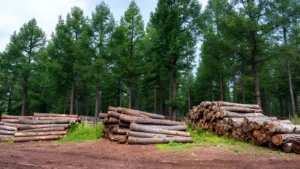




Leave your comment